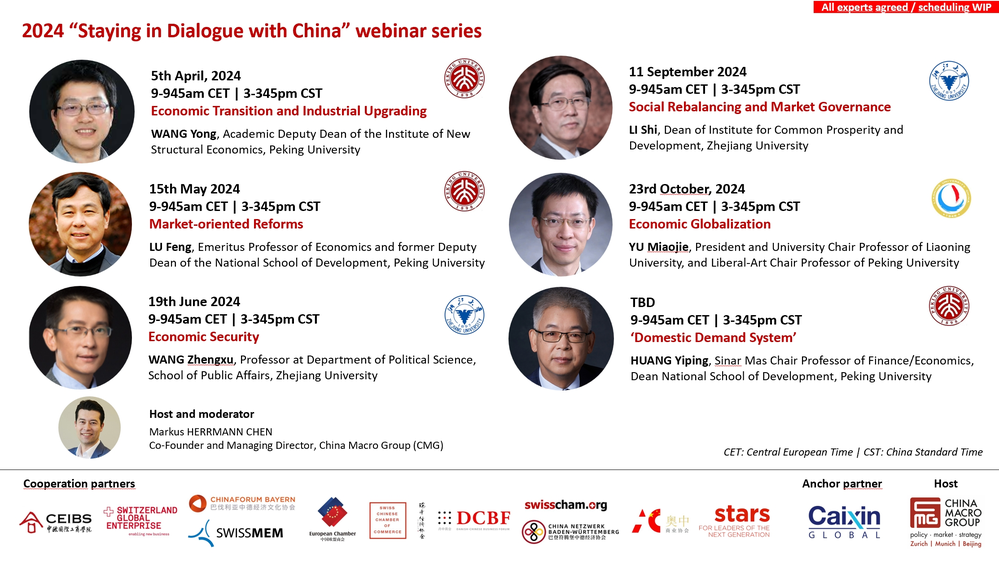Registration
Please click HERE to register.
Please contact melissa.liu@swisscham.org, if you encounter problems with registration or have questions.
Please click HERE to register.
Please contact melissa.liu@swisscham.org, if you encounter problems with registration or have questions.
Dear Members and Friends of SwissCham,
In the second webinar of this year's "Staying in Dialogue with China" series, we are excited to talk to Prof. LU Feng, Emeritus Professor of Economics at the National School of Development (NSD) at Peking University, about China's "market-oriented reforms".
China kicked off its institutional reform from a centrally planned to a more market-oriented economy in the early 1980s under Deng Xiaoping, but – unlike the "shock therapy"-type liberalization of the Soviet Union – Chinese policymakers have been careful in introducing market forces in a gradual and dual-track fashion, essentially letting the market grow out of the plan. So, after 45 years, the state still plays a prominent role in China's economy, even with the policy goal of letting the market play a "decisive role" in allocating resources.
What are the roles of the "visible" and "invisible" hands in the market based on CCP ideology? How are factors of production (labor, capital, land, data) liberalized today? What are policy factors preventing more rapid liberalization in general? How to balance market forces and government interventions in view of China's innovation and security needs? What is the link of 'market-oriented reforms' and 'industrial upgrading' as two structural transitions? What are policy trends regarding capital (state, private and foreign), e.g. the 'mixed-ownership reform'? What is the reform logic for China's financial system? How are anti-monopoly and IP protection evolving under the 14th Five-Year-Plan?
The webinars will be moderated by Markus Herrmann, Co-Founder and Managing Director of CMG. Take the opportunity to listen in and ask your questions to Prof. LU.
We are looking forward to welcoming you to this interesting seminar.
Kindly note: This webinar is held under Chatham House Rules and will not be recorded.
*******
"与中国对话"系列网络研讨会第二场,诚邀北京大学国家发展研究院经济学名誉教授卢锋教授谈论中国的"市场导向"改革"。
20世纪80年代初,在邓小平的领导下,中国开始了从中央计划经济转向更加市场化经济的体制改革,但与苏联的"休克疗法"式自由化不同,中国政策制定者在引入市场力量方面一直非常谨慎,渐进和双轨的方式本质上是让市场在计划之外增长。因此,45年后,尽管政策目标是让市场在资源配置中发挥"决定性作用",但国家在中国经济中仍然发挥着突出作用。
根据现有意识形态,市场中"看得见的"手和"看不见的"手分别扮演什么角色?今天生产要素(劳动力、资本、土地、数据)如何自由化?总体而言,阻碍更快自由化的政策因素有哪些?针对中国的创新和安全需求,如何平衡市场力量和政府干预? "市场化改革"和"产业升级"作为两次结构性转型有何联系?关于资本(国家、私人和外国)的政策趋势是什么,例如"混合所有制改革"?中国金融体系的改革逻辑是什么? "十四五"反垄断和知识产权保护如何发展?
网络研讨会将由 CMG 联合创始人兼董事总经理 Markus Herrmann 主持。借此机会聆听并向卢教授提问。
欢迎您参加此次网络研讨会。
温馨提示:所有网络研讨会均遵循查塔姆宫规则,非公开会议,不会被记录。
With best regards,
Your SwissCham Team
After 45 years of exceptional development and growth, structural complexities in China's political economy are becoming increasingly challenging, calling for policymakers to skillfully navigate China's economy towards the proclaimed 'High-Quality-Development'. To make sense of these complexities and potential policy conundrums that shape the strategic context for foreign business, CMG looks at China's political economy and evolving policy environment by way of six structural transitions – three longer-term transitions that China embarked on with the 'reform and opening up' (改革开放) period, and three more recent transitions involving policy-steered trade-offs and rebalancing.
In this 2024 "Staying in Dialogue with China" webinar series, CMG will explore, debate and refine this conceptualization to these six structural transitions featuring six distinguished Chinese economists as expert speakers. Click here to find out more about the entire series.
